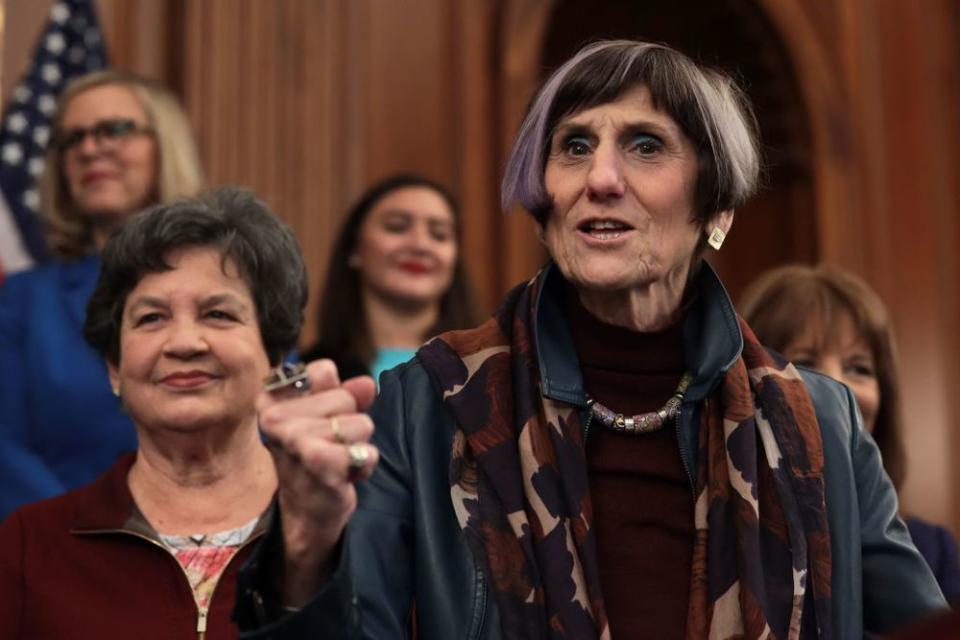The Protracted Battle to Strengthen the Equal Pay Act Enters Its 22nd Year—and the #MeToo Era
When House Speaker Nancy Pelosi spoke at the reintroduction of the Paycheck Fairness Act in January, she said she hoped President Donald Trump would sign it into law by Tuesday, April 2, known as Equal Pay Day,
Well, Equal Pay Day 2019, will come and go without Trump approving the bill, but the lifetime of this legislation is not measured in days, weeks or even months. After all, Rep. Rosa DeLauro (D–Conn.) has introduced the bill in every Congress since 1997. But that’s not to say the bill is without momentum; the House voted on the Paycheck Fairness Act for the first time in eight years last week—and passed it by its highest vote total ever.
Pelosi had a succinct response to that outcome: “This is historic. Rosa has been introducing this bill forever.”
When DeLauro first proposed the legislation, its stated purpose was to “revise and increase remedies and enforcement on behalf of victims of discrimination in the payment of wages on the basis of sex.” In essence, giving sharper teeth to the Equal Pay Act of 1963 that was supposed to enshrine the concept of ‘equal pay for equal work’ in the law.
In the intervening two decades, the bill’s language hasn’t changed dramatically because the problem it targets—the reality of women’s unequal pay for equal work—remains. The gender pay gap was 26% in 1997; it now hovers in the 20% range, according to Census data.
“Women earn less regardless of the choices they make in their career or education,” DeLauro said on the House floor last Wednesday. “Across industry, whether you’re a financial manager or registered nurse, a school teacher, or an executive, a pay gap exists between men and women.”

The current bill seeks to bolster equal pay protections by banning employees from asking about workers’ salary history (a growing trend at the state and local level); eliminating the employer practice of salary confidentiality, meaning women could more easily learn of wage discrepancies; and requiring employers to disclose salary data to the Equal Employment Opportunity Commission in an effort to better suss out troublesome pay trends.
The bill has bipartisan support; it has one Republican co-sponsor in the House, and seven members of the GOP voted in favor of it last week.
But Republican control of Congress has meant the legislation has languished in the past. Before last week, the House had waited eight years to even hold a vote on the measure.
The GOP argues that the Paycheck Fairness Act is unnecessary because gender discrimination is already against the law. The legislation, they say, would lead to frivolous lawsuits by giving workers more opportunities to sue their employers and would incentivize companies to not hire women.
Nevertheless, Democrats say their long-sought-after cause has new relevancy amid the #MeToo movement, which has prompted a nationwide reckoning over women’s too-small share of societal power.
Pelosi has argued that “public sentiment—public, social media, and all the rest—will help us with this.”
“[T]he issue and our environment have collided,” DeLauro said last week. “Equal pay is at the center of our public discourse and Paycheck Fairness is ready for passage today.”
In a March 2019 survey by HuffingtonPost/Yahoo!/CARE, three-quarters of respondents said the pay discrepancy between men and women is a problem; more than half consider it a “serious problem.” Businesses say they’re cognizant of the need to take action on the gender pay gap with some firms—Citi, Intel, Adobe, and Salesforce, for instance—going public with their efforts to achieve pay parity.
But even with those forces behind the Paycheck Fairness Act, it will hit potentially insurmountable political headwinds in the Republican-controlled Senate. There’s a question as to whether the measure will even get a vote in the chamber, where it was received last Thursday, since Senate Majority Leader Mitch McConnell (R–Ky.) has previously referred to the act as “just another Democratic idea that threatens to hurt the very people that it claims to help.”
Before the House vote last week, DeLauro nodded to the protracted course her legislation has taken from the floor. “I can not tell you how difficult it has been to break through on something so simple,” she said. “Men and women in the same job deserve the same pay.”
Even with last week’s victory, she may have to push the issue for a bit longer.
